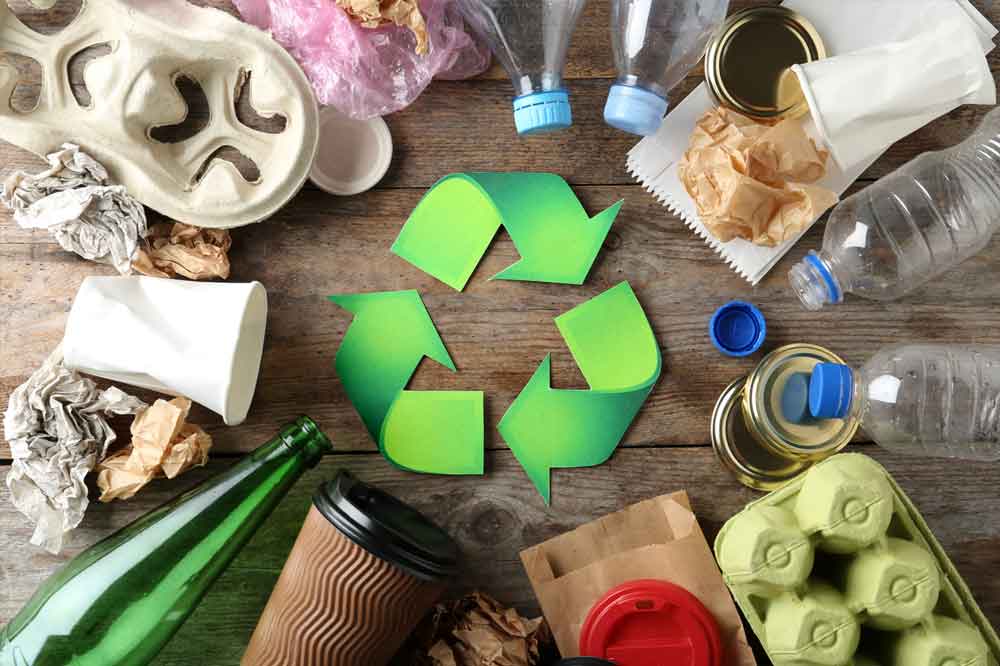10 Recycling Blunders You’re Likely Guilty of Committing

We all strive to do our part in protecting the environment by separating our household rubbish from recyclables. However, many UK households unknowingly make common recycling mistakes that result in a significant amount of waste ending up in landfills. Sorting recyclables from non-recyclables can be challenging, especially considering that each local authority in the UK has different policies for waste collection. It can feel overwhelming to operate a mini waste management business from your own kitchen, only to discover that your efforts may not be sufficient.
To ensure that your recycling efforts are not in vain, let’s explore some of the most common recycling mistakes made in the UK and what you should do instead.
Dirty Paper and Cardboard in Recycling
Paper and cardboard contaminated with food or used for cleaning purposes cannot be recycled. Greasy pizza boxes, used kitchen rolls, and tissue paper should be discarded as general waste. Only clean cardboard and paper without contamination can be recycled into useful materials.
Embrace Reusability: Give Jars a Second Life
Reusing jars is not only environmentally friendly but also a cost-effective option. Rather than discarding large jars and purchasing new plastic containers, repurpose jars for storage or use them as trendy serving vessels for drinks or spices.
Using Plastic Bags for Recycling
Placing recyclables in plastic bags leads to them being sent to landfills instead of being properly processed. Emptying the recycling directly into the collection box is the best approach. Avoid using plastic bags altogether and opt for reusable alternatives.
Disposal of Soft Plastics in Recycling
Soft plastics like crisp packets and salad bags cannot be recycled with regular plastic waste. These items require special recycling schemes outside of local authority collections. It’s important to check your local authority’s guidelines to determine their specific requirements. Many supermarkets now offer collection points for soft plastics, or you can participate in programs like TerraCycle, which offers incentives for returning these items.
Responsible Disposal of Batteries through Recycling
Batteries, particularly lithium-ion (Li-ion) and nickel-metal hydride (NiMH) batteries are hazardous and should not be included in regular recycling. Take them to designated recycling centers or utilize collection bins provided by local supermarkets. Consider using rechargeable batteries to reduce
Assuming all plastic packaging is recyclable
Several types of plastic packaging are unsuitable for recycling, such as polystyrene, medicine packets, black plastic packaging, paper coffee cups, drinks cartons, plastic pouches, and toothpaste tubes. Making greener purchasing choices and opting for alternatives can help eliminate the need to recycle these items altogether.
Proper Rinsing of Containers for Recycling
Not many people do this but rinsing out glass jars and plastic containers before recycling them is essential. Food residue can contaminate the recycling process. A quick rinse using a dishwasher can make the task easier.
Avoid Wishcycling
“Wishcycling” refers to attempting to recycle non-recyclable items in the hope that they will be processed correctly. It is important to adhere to your local authority’s recycling criteria. If an item does not meet the requirements, it should be placed in general waste. Explore other options before disposing of an item.
Proper Handling of Loose Bottle Tops
While plastic lids from glass jars should be removed, plastic bottle tops can be left on the bottles. Flattening the bottle to release the air and then screwing the lid back on is the best practice. However, soap dispenser pumps should be removed and discarded separately.
Remove Tape for Effective Cardboard Recycling
Cardboard boxes can be recycled, but the plastic tape used to secure them must be removed. Similarly, Christmas wrapping paper with plastic tape and paper envelopes with plastic windows cannot be recycled together. Consider alternatives to wrapping paper or removing the tape before.
By avoiding these common recycling mistakes and adopting proper recycling practices, you can contribute to a more sustainable future. Remember to stay informed about your local authority’s recycling guidelines and explore alternative options for reducing waste. Together, we can make a difference in preserving our environment for generations to come.
At GB Skips we utilize our advanced recycling screening line to efficiently sort through mixed waste at our state-of-the-art sites in Leyton and Hainault.
Our cutting-edge screening technology enables us to separate different types of waste effectively. From plastics and paper to metals and organic materials, our dedicated team ensures that every item is properly identified and directed toward the appropriate recycling process.
By entrusting your waste management to GB Skips, you can rest assured that we will handle your company’s waste responsibly and ethically. We are committed to promoting sustainability and reducing the environmental impact of waste disposal.
Why choose GB Skips?
🌍 Environmentally friendly waste management solutions
🔬 Advanced recycling screening technology
♻️ Proper separation and recycling of all waste materials
📞 Excellent customer service and support
Take a step towards a greener future and make a positive impact on the environment. Contact GB Skips today and let us take care of your company’s waste, ensuring that it is recycled and repurposed in the most efficient way possible. Together, let’s create a cleaner and more sustainable world for future generations. Choose GB Skips and make a difference today!